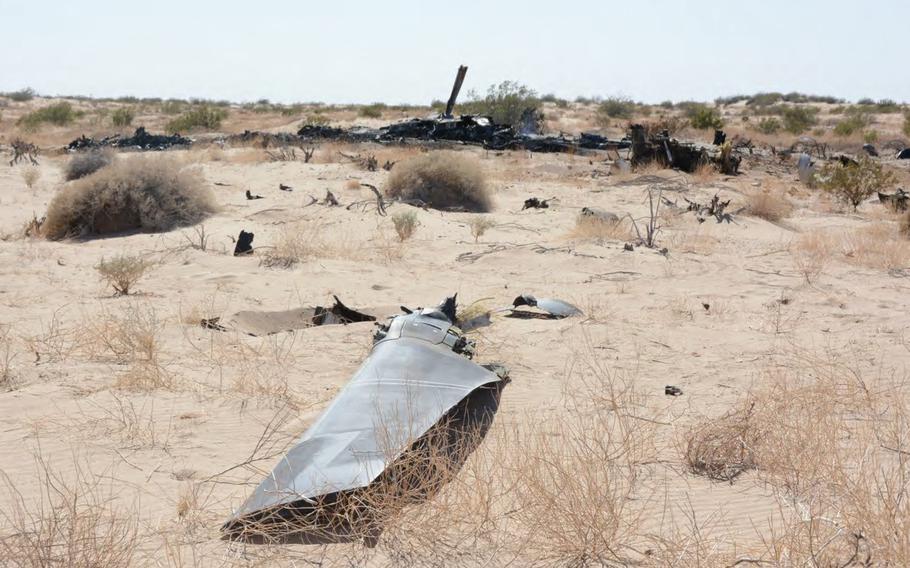
A photo attributed to a Marine Corps accident investigation report shows the site in Imperial County, Calif., where an MV-22 Osprey crashed June 8, 2022, killing five Marines on board. (Wisner Baum)
The families of four Marines killed in an MV-22 Osprey crash two years ago have filed suit in San Diego federal court alleging the tiltrotor’s makers are liable for its defective design and manufacture.
The suit filed Thursday names Boeing, Bell Textron, Rolls Royce Corp. and Rolls Royce North America.
“The aircraft, as fielded, has failed and continues to fail to meet the government’s safety and reliability specifications and requirements,” the suit alleges. The “aircraft is not safe in the vertical operating mode, horizontal operating mode, or any transitional or other operating mode in between.”
The lawsuit stems from the crash June 8, 2022, in Southern California of a Marine Osprey, call sign Swift 11, that killed five crew members: pilots Capt. Nicholas P. Losapio, 31, of Rockingham, N.H, and Capt. John J. Sax, 33, of Placer, Calif.; crew chiefs Cpl. Nathan E. Carlson, 21, of Winnebago, Ill.; Cpl. Seth D. Rasmuson, 21, of Johnson, Wyo.; and Lance Cpl. Evan A. Strickland, 19, of Valencia, N.M.
Family members of all but Losapio are named as plaintiffs in the suit filed by Wisner Baum, a Los Angeles firm.
“We seek accountability, answers, and change,” Amber Sax, the widow of John Sax, said in a news release Thursday from the law firm. “Our goal isn’t to see this platform removed; it’s to know that someday we will be able to say, ‘their lives enabled others to live,’ knowing what happened to them won’t ever be repeated.”
The suit alleges that the pilots were unable to intervene when the aircraft systems failed in flight.
“Due to the Osprey’s lack of compliance with government specifications, the SWIFT 11’s pilots and crew were powerless to counteract the aircraft’s uncontrollable asymmetric thrust condition where there was a sudden loss of thrust on the right proprotor and positive thrust on the left proprotor,” the suit alleges.
A Bell spokesman, Jay Hernandez, on Thursday told McClatchy News the company cannot comment on matters of litigation, according to the Charlotte, N.C., Observer. Boeing and Rolls Royce could not be reached by Stars and Stripes after business hours.
The Marine Corps determined that Swift 11 was brought down by a dual hard clutch engagement, a problem identified in 2017 that has plagued the aircraft and resulted in Osprey groundings or stand-downs across the military at least twice while it was addressed.
In the case of Swift 11, the problem resulted in “a catastrophic loss of thrust on the right-hand proprotor” that led to an unrecoverable loss of control and the fatal crash, according to a Marine Corps statement in July 2023 on its accident investigation.
The Osprey’s twin, rotating engines allow it take off and land vertically like a helicopter but fly like an airplane.
Attorney Tim Loranger of Wisner Baum, a specialist in aviation law, said the firm has spoken to families of service members that died in a Marine Osprey in Australia and an Air Force Osprey in southern Japan, both crashes in 2023. Eleven service members died in those mishaps.
“We don’t know there’s a common thread with these other crashes,” Loranger told Stars and Stripes on Friday. “We’re not speculating on a common cause.”
However, if the report expected this summer on the Nov. 29 Air Force crash in Japan indicates a similar cause, it “may inform” Loranger’s case on behalf of the Marine families, he said.
Loranger, a former Marine aircraft mechanic and Gulf War veteran, said he has experience with similar cases involving the military, which is immune to liability suits under the Feres doctrine.
“When something goes wrong because of a manufacturer or designer’s defect, I think those things need to be discovered and corrected,” he said. “They are particularly difficult [cases] and have a lot of legal issues to overcome. We take them on if we think they are righteous and necessary cases.”